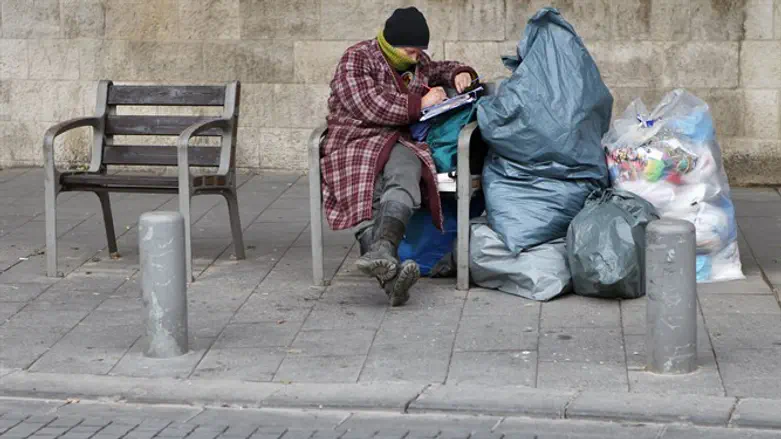
More than 20 percent of Israelis are living below the poverty line, according to the country's annual poverty report, showing a slight drop from the previous year.
The data for the report released Thursday by the National Insurance Institute was gathered by the Central Bureau of Statistics from a survey of 9,000 Israeli households.
According to the report, in 2015 there were 1,712,900 people living below the poverty line, or 21.7 percent of the population. That was a decrease from the 22 percent in 2014.
For an individual, the poverty line is one living on less than 3,158 shekels, or $821 a month.
Some 460,800 families, or 19.1 percent, were living below the poverty line, including 764,200 children. That was a slight rise from the 18.8 percent in 2014.
According to the report, the poor in 2015 were poorer than in 2014, with the gap between income and the poverty line increasing.
The poverty rate among haredi families decreased to 48.7 percent from 54.3 percent a year earlier. Haredi families make up 17 percent of the poor families in Israel. A rise in child benefits and more employment were seen as reasons for the decrease.
The poverty rate among Arab-Israeli families increased to 53.3 percent from 52.6 percent in 2014. The report said it was not clear why the rate increased, noting the rise in child benefits.
The minimum wage is expected to rise next month for the second time in a year.
Israel has the highest poverty rates of all developed countries, the report noted, citing figures from the Organization for Economic Cooperation and Development, or OCED.
An alternative poverty report released earlier in the week by the Israeli NGO Latet found that some 29 percent of all Israelis live in poverty.
Meanwhile, a survey released Wednesday by the International Fellowship of Christians and Jews in advance of the national poverty study found that 81 percent of the Israeli poor say they lack the ability or opportunity to escape the cycle of poverty. The survey also found that 21 percent of the respondents believe their children’s economic futures will significantly improve and some 25 percent would leave Israel for another country if they could.